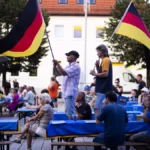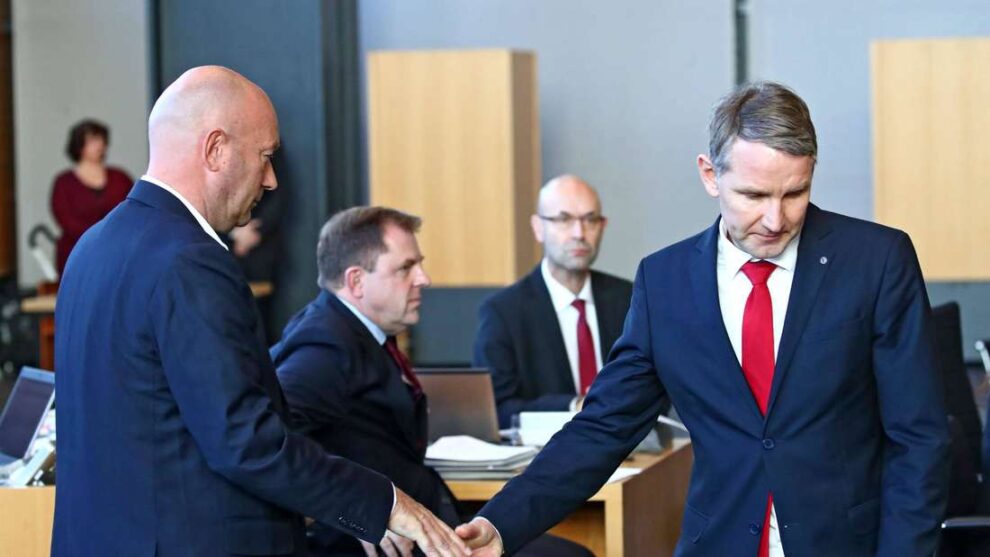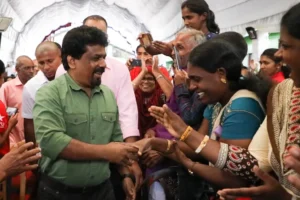Workers and young people must take the recent events in Thuringia as a serious warning. The decision of the Christian Democrats (CDU) and Liberal Democrats (FDP) to pass a law to lower the land transfer tax with the votes of the far-right Alternative for Germany (AfD) is another step on the road to giving the fascists access to the levers of power.
The vote involved more than the passage of a reactionary law that will mainly benefit rich landowners and real estate speculators. The CDU and FDP deliberately formed a potential government majority with the AfD against the incumbent Social Democratic (SPD)-Left Party-Green state government of Prime Minister Bodo Ramelow (Left Party), which has so far been tolerated—at least officially—by the CDU.
The procedure is reminiscent of developments after the last state elections. In early 2020, the CDU and FDP elected Thomas Kemmerich, a member of the FDP, as Thuringia’s prime minister with the votes of the AfD. Due to massive protests, Kemmerich was forced to resign, but the deliberate strengthening of the AfD continued, even though it positioned itself more and more openly as a fascist party.
This is particularly evident in Thuringia. AfD state leader Björn Höcke is a völkisch nationalist and racist who systematically works to revive Nazi politics. Höcke is currently standing trial before the Halle Regional Court for allegedly using the banned slogan of the Nazi storm troopers (Sturmabteilung—SA), “All for Germany,” in a speech in Merseburg in 2021.
Höcke’s Merseburg speech was no aberration. In his even more infamous Dresden speech four years earlier, he called for a “180-degree turnaround in remembrance policy,” and criticised the Holocaust Memorial in Berlin, saying, “The Germans are the only people in the world who have planted a monument of shame in the heart of their capital city.”
In his 2018 book Never In the Same River Twice, Höcke rants about the “death of the people through population exchange,” and calls for the deportation of “culturally alien” people from Germany in a “large-scale remigration project.” In implementing such a policy, he writes, “There will be no getting around a policy of ‘well-tempered cruelty.’”
While leading representatives of the CDU and FDP justified the joint vote with the Höcke fascists, the SPD, Greens and Left were appalled. Ramelow spoke of a “unique event” and a “pact with the devil.” Katja Mast, first parliamentary secretary of the SPD parliamentary group, called the vote a “very special breach of political taboo.” The Green vice-president of the Bundestag (federal parliament), Katrin Göring-Eckardt, warned that now “not only is the firewall no longer there, but there is open cooperation [with the AfD].”
Coming from the SPD-Left Party-Greens, this is pure hypocrisy, which serves above all to cover their own tracks. Thuringia, in particular, shows how openly even the nominally left parties cooperate with the AfD. After Kemmerich’s resignation and his re-election in February 2020, Ramelow himself worked at closing ranks with the AfD. He helped the AfD’s Michael Kaufmann into the office of vice-president of the Thuringian state parliament with his own vote, and bragged about it publicly on Twitter. He said he had decided “very fundamentally, with my vote, to clear the way for parliamentary participation, which must be granted to every parliamentary group.”
Since then, under the “left” state prime minister, all of the state parliamentary parties have been cooperating closely with the right-wing extremists. A glance at the parliamentary committees underscores this.
For example, the Committee for Economy, Science and Digital Society is chaired by AfD parliamentarian Dieter Laudenbach (his deputy is Kemmerich). The committee for Migration, Justice and Consumer Protection and the committee for Environment, Energy and Nature Conservation are also headed by AfD members. Their respective deputies are recruited from the SPD and the Greens. The AfD, for its part, provides the deputy of the Prison Commission (a subcommittee of the Petitions Committee), which is led by the Left Party.
At the municipal level, too, there has long been a policy of “open” cooperation of all of the establishment parties with the fascists. For example, Green city councillors in the constituency of their party leader Ricarda Lang in Baden-Württemberg, of all places, approved an AfD motion last year. In Hildburghausen, Thuringia, the SPD collaborates with the AfD, and in 2014 the Left Party in the municipal council of Muldestausee in Saxony-Anhalt formed one of the first parliamentary groups with the AfD.
When the first AfD district councilor, Robert Sesselmann, was elected in Sonneberg in Thuringia at the end of June, the SPD mayor in neighbouring Coburg, Dominik Sauerteig, immediately justified the election and declared that he would take Sesselmann “very concretely to task” in joint work for the region.
The same close cooperation takes place at the federal level. In the Bundestag, all parties have been working together with the fascists in committees since the AfD entered the parliament in 2017. In doing so, they have not only created the social, ideological and political conditions for the rise of the AfD in recent years, but have also adopted large parts of its programme. In addition to aggressive action against refugees and “let it rip” policies in regard to the COVID pandemic, the more established parties have welcomed the AfD’s support for the government’s pro-war policy.
Source : WSWS
















